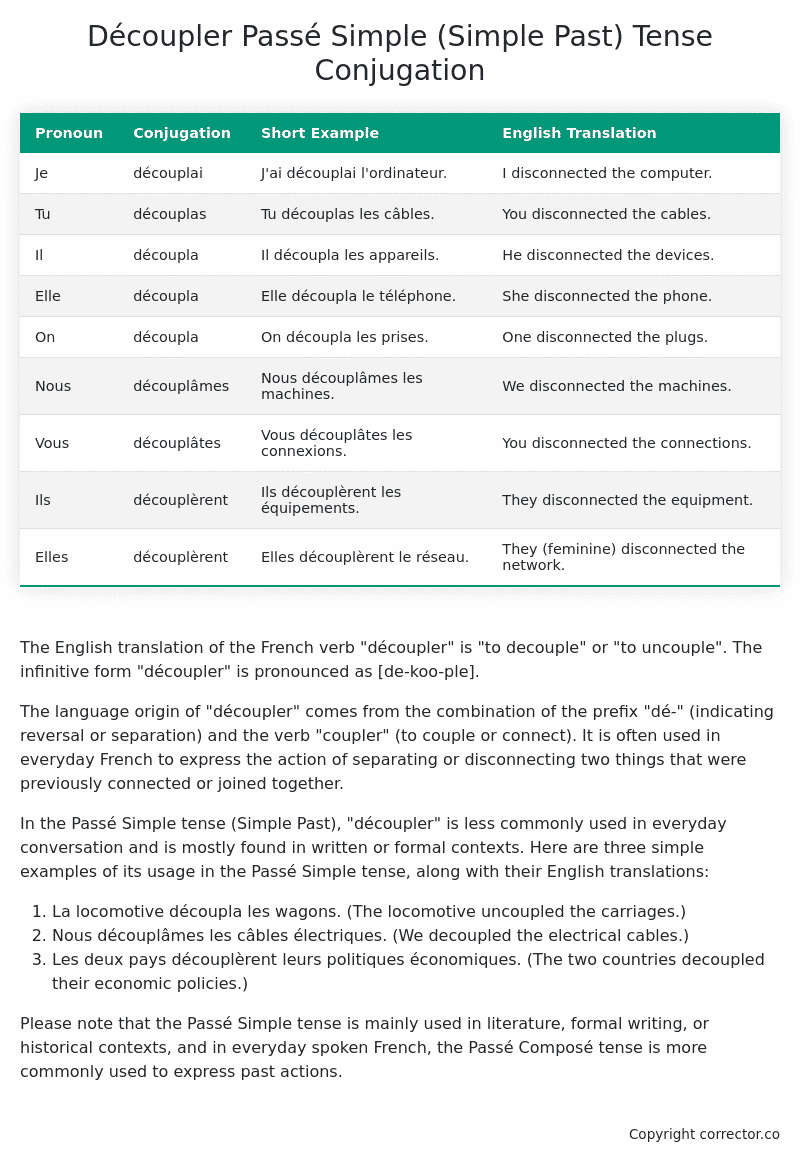Passé Simple (Simple Past) Tense Conjugation of the French Verb découpler
Introduction to the verb découpler
The English translation of the French verb “découpler” is “to decouple” or “to uncouple”. The infinitive form “découpler” is pronounced as [de-koo-ple].
The language origin of “découpler” comes from the combination of the prefix “dé-” (indicating reversal or separation) and the verb “coupler” (to couple or connect). It is often used in everyday French to express the action of separating or disconnecting two things that were previously connected or joined together.
In the Passé Simple tense (Simple Past), “découpler” is less commonly used in everyday conversation and is mostly found in written or formal contexts. Here are three simple examples of its usage in the Passé Simple tense, along with their English translations:
- La locomotive découpla les wagons.
(The locomotive uncoupled the carriages.) - Nous découplâmes les câbles électriques.
(We decoupled the electrical cables.) - Les deux pays découplèrent leurs politiques économiques.
(The two countries decoupled their economic policies.)
Please note that the Passé Simple tense is mainly used in literature, formal writing, or historical contexts, and in everyday spoken French, the Passé Composé tense is more commonly used to express past actions.
Table of the Passé Simple (Simple Past) Tense Conjugation of découpler
| Pronoun | Conjugation | Short Example | English Translation |
|---|---|---|---|
| Je | découplai | J’ai découplai l’ordinateur. | I disconnected the computer. |
| Tu | découplas | Tu découplas les câbles. | You disconnected the cables. |
| Il | découpla | Il découpla les appareils. | He disconnected the devices. |
| Elle | découpla | Elle découpla le téléphone. | She disconnected the phone. |
| On | découpla | On découpla les prises. | One disconnected the plugs. |
| Nous | découplâmes | Nous découplâmes les machines. | We disconnected the machines. |
| Vous | découplâtes | Vous découplâtes les connexions. | You disconnected the connections. |
| Ils | découplèrent | Ils découplèrent les équipements. | They disconnected the equipment. |
| Elles | découplèrent | Elles découplèrent le réseau. | They (feminine) disconnected the network. |
Other Conjugations for Découpler.
Le Present (Present Tense) Conjugation of the French Verb découpler
Imparfait (Imperfect) Tense Conjugation of the French Verb découpler
Passé Simple (Simple Past) Tense Conjugation of the French Verb découpler (You’re reading it right now!)
Passé Composé (Present Perfect) Tense Conjugation of the French Verb découpler
Futur Simple (Simple Future) Tense Conjugation of the French Verb découpler
Futur Proche (Near Future) Tense Conjugation of the French Verb découpler
Plus-que-parfait (Pluperfect) Tense Conjugation of the French Verb découpler
Passé Antérieur (Past Anterior) Tense Conjugation of the French Verb découpler
Futur Antérieur (Future Anterior) Tense Conjugation of the French Verb découpler
Subjonctif Présent (Subjunctive Present) Tense Conjugation of the French Verb découpler
Subjonctif Passé (Subjunctive Past) Tense Conjugation of the French Verb découpler
Subjonctif Imparfait (Subjunctive Imperfect) Tense Conjugation of the French Verb découpler
Subjonctif Plus-que-parfait (Subjunctive Pluperfect) Tense Conjugation of the French Verb découpler
Conditionnel Présent (Conditional Present) Tense Conjugation of the French Verb découpler
Conditionnel Passé (Conditional Past) Tense Conjugation of the French Verb découpler
Conditionnel Passé II (Conditional Past II) Tense Conjugation of the French Verb découpler
L’impératif Présent (Imperative Present) Tense Conjugation of the French Verb découpler
L’impératif Passé (Imperative Past) Tense Conjugation of the French Verb découpler
L’infinitif Présent (Infinitive Present) Tense Conjugation of the French Verb découpler
L’infinitif Passé (Infinitive Past) Tense Conjugation of the French Verb découpler
Le Participe Présent (Present Participle) Tense Conjugation of the French Verb découpler
Le Participe Passé (Past Participle) Tense Conjugation of the French Verb découpler
Struggling with French verbs or the language in general? Why not use our free French Grammar Checker – no registration required!
Get a FREE Download Study Sheet of this Conjugation 🔥
Simply right click the image below, click “save image” and get your free reference for the découpler Passé Simple tense conjugation!

Découpler – About the French Passé Simple (Simple Past) Tense
Formation
Usage
Narration
Historical Context
Interactions with other tenses
Passé Composé
Imparfait
Conditional and Subjunctive
Summary
I hope you enjoyed this article on the verb découpler. Still in a learning mood? Check out another TOTALLY random French verb conjugation!


